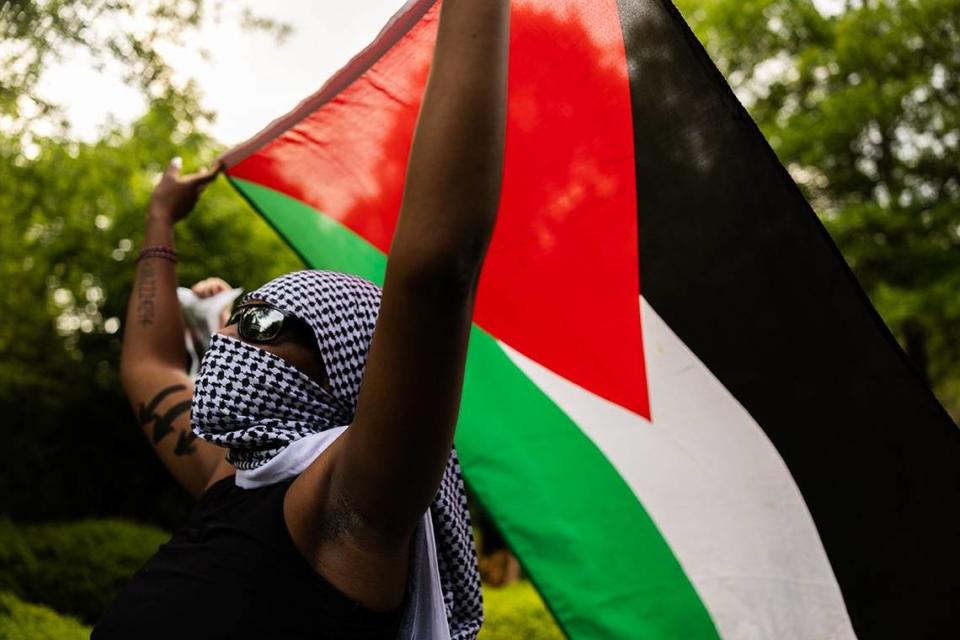UNC Charlotte ‘leveraged its power’ against pro-Palestinian protests, supporters say
Supporters of Israel-Hamas war protests at UNC Charlotte say they’re “disgusted” after police dismantled a pro-Palestine encampment at the college this week, resulting in one arrest.
Students, teachers and other supporters gathered outside the government center in uptown Wednesday afternoon, responding to the university’s and Charlotte-Mecklenburg police’s move to shut down the encampment. They say students have been suspended in connection with the protests.
“UNCC protest organizers have been denied a good faith conversation with university administration about their demands, and the university has, instead, leveraged its power to silence students and community members,” said Sam Poler, a member of Jewish Voice for Peace, an anti-Zionist Jewish advocacy organization. “UNCC’s actions are making everyone less safe.”
Protests in Charlotte are joined by many others across the country, with participants setting up tents, making signs and occupying buildings. Police at colleges across the country have clashed frequently with protesters. Last month, police charged 36 people at UNC Chapel Hill and protesters threw water on interim Chancellor Lee Roberts and officers as they worked to put back up an American flag.
Police in Charlotte dismantled the encampment early Tuesday morning after ordering protesters to disperse. Later that evening, around 50 protesters marched through UNC Charlotte’s campus. One UNC Charlotte protester was arrested overnight and released Wednesday before being arrested a second time for returning to campus, The Charlotte Observer’s news partner WSOC-TV reported.
Organizers said the use of force by university police and CMPD in removing protesters was unwarranted.
“We are disgusted at the use of force against students,” Poler told the press. “Police threw away personal belongings and community-donated supplies from the encampment, supplies that students had planned to donate to local organizations.”
Protesters suspended from UNC Charlotte?
The university issued a statement Wednesday detailing what police found at the encampment site.
“Various concerning items were discovered, including knives, box cutters, a collection of baseball-sized rocks, and a mattress that was used to collect and store feces,” the statement said. “Over the past several days, an encampment on UNC Charlotte’s campus has been marked by escalating violations of law and policy, including the erection of unauthorized structures, defacement of University property, and the disruption of academic activities and final exams.”
University officials declined to comment whether students had been suspended, but speakers at Wednesday’s press conference said there had been “several suspensions.” At the same conference, students declined to give their names and wore scarves and masks in front of news cameras in order to avoid being identified by university personnel.
Jewish Voice for Peace called on UNC Charlotte officials to drop all charges and overturn all suspensions made in connection with the encampment.
What do UNC Charlotte protesters want?

Protesters are calling on the university to divest from its activities in Israel and any other investments contributing to the war in Gaza. Most notably, protesters called on UNC Charlotte administration to divest from its Mount Zion Archeological Project in Jerusalem, which has been funded and staffed in part by UNC Charlotte students and staff since 2008.
The school released additional information about the project Wednesday, saying excavation at the site ended in 2023 and that remaining work involves cleaning and conservation, which students won’t be involved in.
“All funds from this project were raised from private donors; no state or University funds were used. The donated funds were used to cover the logistical costs of managing the project in the field, undertaking scientific research on the artifacts, and preparing publications,” the university said in a statement. “Additional private funds will be raised when necessary to complete the research and publication of the work, not for fieldwork.”
The university also clarified the site’s location.
“The archaeological work in Jerusalem was conducted on ‘common’ land that was set aside as a green park in the 1920s. It is important to note the University project was undertaken on the traditional Mount Zion, not the biblical Mount Zion (also known as the ‘City of David’). They are two different and distinct locations,” the statement said.
Critics claim the project contributed to the displacement of Palestinian families, while the university claims the project maintained an outreach program with the local Palestinian community.


